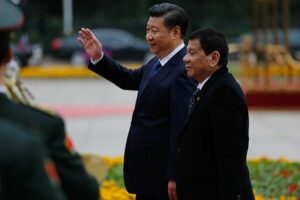WHATEVER “gentleman’s agreement” former Philippine President Rodrigo R. Duterte had with Chinese President Xi Jinping away from public knowledge — like denying BRP Sierra Madre of building materials to reinforce its position in the South China Sea — is “constitutionally void,” a congressman said on Sunday.
Mr. Duterte allegedly struck an agreement with China to keep the status quo at Second Thomas Shoal, known to Filipinos as Ayungin Shoal, by not including building materials in its resupply missions to the World War II-era battleship grounded intentionally to secure Manila’s claim on the territory.
“The so-called ‘agreement,’ if any, is constitutionally void since it is tantamount to the surrender of our country’s sovereign rights over our exclusive economic zone,” Deputy Majority Leader and Mandaluyong City Rep. Neptali M. Gonzales II said in a statement.
Beijing urged the Philippines to uphold the supposed “gentleman’s agreement” which Mr. Duterte and Mr. Xi allegedly shook on to de-escalate the tensions over the South China Sea.
The Philippine government and Mr. Duterte himself has denied it was a pact.
“As is, where is. You cannot bring in materials to bring in and improve (BRP Sierra Madre), though there was no agreement,” Mr. Duterte said last week in a press briefer about the supposed agreement.
The Philippines intentionally grounded the ship at Second Thomas Shoal in 1999 to maintain Manila’s claim of the territory 200 kilometers west of Palawan Island and 1,000 km off Mainland China’s nearest landmass.
Manila’s effort to resupply a grounded ship has been repeatedly blocked by the Chinese Coast Guard, using water cannons that have resulted in the injury of Filipino troops.
“Like the President, I am truly horrified by the idea that our country’s territory, sovereignty, and sovereign rights may have been compromised by a deal guised as an ‘agreement’ to maintain the peace and status quo in the West Philippine Sea,” Mr. Gonzales said in a statement.
Last week, President Ferdinand R. Marcos, Jr. said he was “horrified by the idea” that the Philippines’ position might have compromised through a secret agreement Mr. Duterte might have made.
But Mr. Gonzales said the agreement is void as it is “equivalent to a new national policy, which must be enshrined in a treaty to be submitted to the Senate for ratification before it can take effect.”
Regardless of the nature of the agreement, it won’t be enforced by the Philippines as there was no executive agreement between Manila and Beijing on the matter.
“Since there is no official record under our records, the alleged ‘agreement’ may not be considered an executive agreement,” he added.
Mr. Gonzales said the issuance of Executive Order (EO) No. 57 signals the country is committed to upholding its sovereignty and territories amid China’s encroachment.
Activated under EO No. 57, the National Maritime Council is a government body tasked to formulate the country’s maritime strategy, a framework that would enhance the Philippines’ territorial and sovereign rights over its seas
CONGRESSIONAL PROBEZambales Representative Jefferson F. Khonghun wants a congressional probe into the supposed Duterte-Xi agreement. “It’s crucial to ascertain the truth if indeed the Duterte administration struck such a deal with China,” he said.
The House of Representatives expressed concerns that the alleged agreement shows Beijing’s increasing influence in the country’s domestic affairs, which could steer Manila’s policies in its territorial dispute in South China Sea.
The congressman said the House investigation would involve former government officials and diplomatic representatives to shed light on the reported pact.
“Now that Duterte has finally admitted to entering a secret deal with China, it is imperative that Congress hear House Resolution No. 1216 that we have filed as early as last year,” Party-list Rep. France L. Castro said in a separate statement.
House Resolution No. 1216 was filed last August and has remained pending with the House Committee on the West Philippine Sea since September. — Kenneth Christiane L. Basilio
